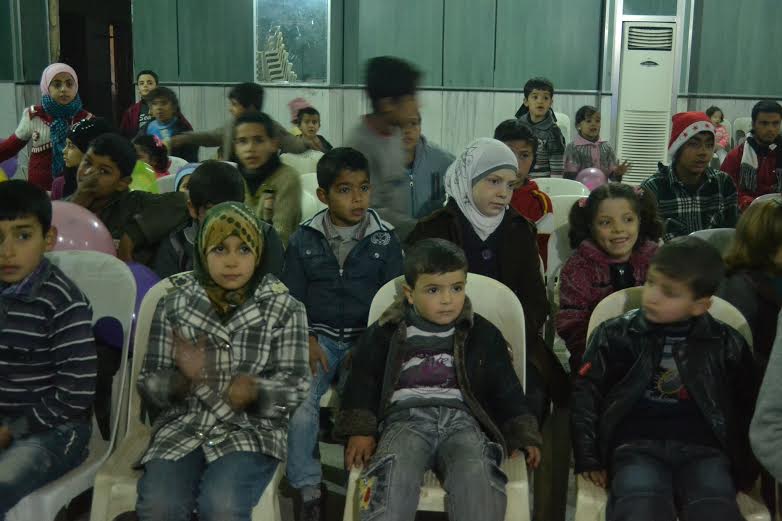Death From Above in Aleppo

We had come to Tariq al-Bab, Aleppo, to celebrate New Year’s Eve 2013 at a children’s festival organised by the Democratic Forum.
I come from a family that celebrates Christmas – my children loved it when Santa Claus would leave gifts for them under the tree – and welcoming in the New Year was always important to me, as well. I did not know then that I would never again celebrate that day.
When the event wound down, finishing with the distribution of prizes, it was time to begin the long journey home, first on foot, then by shared taxi, and finally by running across the river to avoid a sniper stationed on top of the agriculture department’s offices.

There were 11 of us in the group, some from the Democratic Forum, others members of various political groups who had volunteered for the event. Among us there were Arabs and Kurds, Sunnis, Alawites, Ismailis and Druze, all united by a common Syrian identity and by our rejection of an oppressive regime.
We began chanting, “The people demand the fall of the regime! United, the Syrian people are one!”
As we left the hall where the festivities had taken place, I saw a plane above us. I was nervous, but everyone laughed at me. They said that planes did not usually drop bombs here. Instead, the targeted al-Marja daily with barrel bombs and rockets. I felt an uneasy sense of relief.
Still, something made me want to get away from area. We were walking away from the venue when I suddenly felt something hit me.
For a few moments, I did not know it was. It just felt as if someone had lobbed a handful of dirt at us. We all fell to the ground. I looked behind me to see my ten companions all soaked in blood, screaming in pain.
I lost consciousness for a few seconds. Everything was chaos and pandemonium. I came to a few minutes later to hear someone saying, “No one come near, the plane might bomb again!” I knew then that we had all been hit.
It is not uncommon for a plane to bomb an area once and then return to target the same location so as to kill people who are evacuating the wounded. What surprises me is not the pilot’s ability to commit this crime, but by his desire to kill as many civilians as possible. What kind of hatred is that?
I stood up with my hand on my neck. I felt a large hole right below my left ear and tried to assess the damage. I was bleeding profusely, and I couldn’t hear anything with that ear. I ran quickly to hide in the entrance of a building.
I was conflicted over what to do next – should I stay under cover or should I try to drag my wounded friends to safety? Should I try to find out where else I had been wounded? I couldn’t be sure where I had been hit apart from my neck and ear.
Unable to get up, one of my friends crawled along like a child who hasn’t yet learned to walk. She was looking for anything she could hide behind. It was a frightful sight and we were all terrified and confused. What should we do now? Was the plane gone or was the pilot still hunting civilians?
I clung on to life as I was transported to the field hospital, refusing to acknowledge that I was near death. I wanted to live and I fought to remain conscious, but I couldn’t manage it on my own. Every time I felt my eyes closing, someone would force me to wake up. I searched for something positive to think about or plan for. I thought about anything happy.
My wounds continued bleeding and I felt dizzy. I heard the nurse in the hospital say that I was in critical condition, since shrapnel had hit me right next to the main artery that feeds the brain. I felt her trying unsuccessfully to dislodge the shrapnel. Then she ordered me to be transferred to the Zarzur hospital to receive more specialised care.
I was put in a Suzuki car on top of two dead bodies and taken to the other hospital.
I wondered whether these were the last moments of my life. Would I be able to hang on? I kept telling myself that I was not going to die. When my resolve weakened, I looked up at the sky. If this was the end, I wanted the clear blue of the sky to be the last thing I saw. I remember seeing two pigeons, and the sight of them flying free made me happy. In those moments, I refused to die with a vision of blood and destruction. I was determined to take only beauty with me to the afterlife.
Everyone in our group of 11 ended up in hospital that day.
The friend whose legs had been injured suffered a great deal before recovering. Now, she is a model of joy and generosity, working tirelessly in memory of the martyred.
For another friend, a 21-year-old pro-opposition Druze man, that trip had been his first visit to Aleppo. It had been a huge risk for him to leave his pro-regime city of Suweida. That evening we had laughed and danced and played with the children together, and agreed that he would visit again as often as possible. It was not to be – he was martyred that night.
We mourned the death of our friend. Our shared pain brought us together. We were united by catastrophe, love and determination.
Two years on, we are all in different places. But we will persevere despite the threat of death, despite our weariness and despite our suffering. We will continue to chant, “United, the Syrian people are one!”
